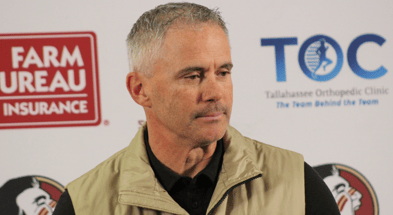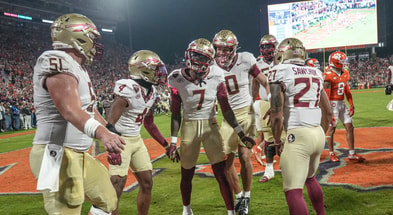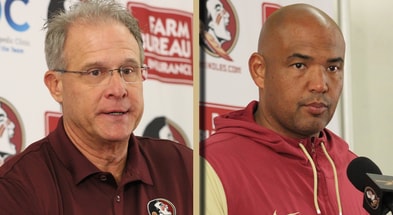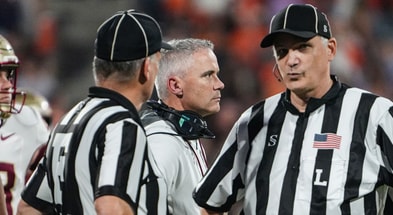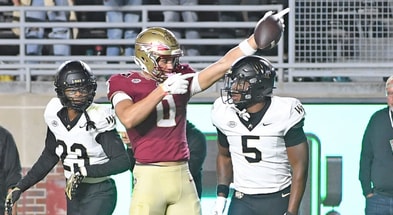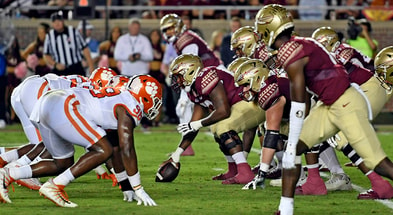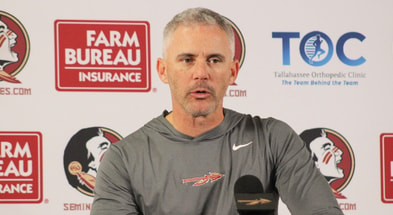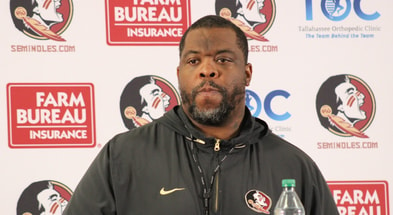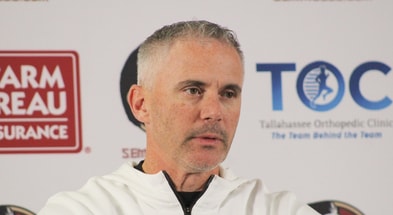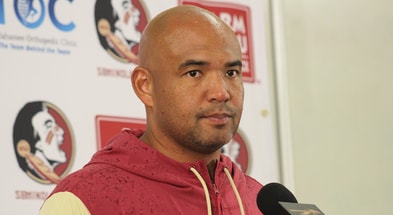'We are woefully underpaid' ... Trustees Chair Peter Collins discusses FSU's battle with ACC

As Florida State’s legal battle with the Atlantic Coast Conference rages on in courtrooms from Leon County to North Carolina, it’s impossible to know exactly how — and how quickly — any of that will be resolved.
Will the Seminoles be able to leave the conference without having to pay more than $500 million in penalties and exit fees? Will they be able to regain control of their media rights and strike up a deal to join the Big Ten or Southeastern Conference? Will any of this happen before the schools in those leagues begin to lap the competition thanks to dramatic increases in annual television revenue?
If FSU Board of Trustees Chairman Peter Collins knows the answers to any or all of those questions, he wasn’t sharing them Monday afternoon, when he spoke at the Capital Tiger Bay Club’s monthly luncheon.
Collins, who is at the forefront of Florida State’s battle with the conference, joked that he assured his colleagues at FSU he would be on his best behavior during this public appearance. But he also made it clear that his position has not changed at all since the university and ACC filed lawsuits against each other in late December.
“At the end of the day, we are worth more than we are getting paid — a lot more than we are getting paid,” Collins said. “And I would challenge anybody to tell me that we’re not. To tell me that we’re worth the same amount as some of the other schools in the conference, from a media standpoint.”
To some degree, that is the essence of Florida State’s issue with the conference.
Because many schools in the ACC do not produce strong TV ratings no matter how well their teams perform on the field, the conference’s television revenue soon will be dwarfed by the hauls of the SEC and Big Ten. The annual disparity is estimated to be at least $30 million to $40 million per school.
With that in mind, Collins said, Florida State officials repeatedly asked the ACC’s leadership to consider unequal revenue sharing, which might reward and appease the likes of FSU, Clemson and other top brands, while reducing the annual payouts to schools that don’t generate as much interest.
But other than offering some increased financial rewards for schools that perform the best on the field, called the success initiative, that concept went nowhere with the conference. Which led to Florida State filing its lawsuit, and Clemson filing its own earlier this year.
“I think our ultimate goal is to get paid for what we’re worth,” Collins said, when asked about the end goal of Florida State’s lawsuit. “And I’ll leave it at that.”
ACC schools have been receiving smaller annual TV payouts than their counterparts in the SEC and Big Ten for a decade or more, and Collins said the Seminoles were always able to make due through fundraising and ticket sales. But the current projections are too large to overcome.
“These are big dollars,” he said. “I think you have to then go and say, ‘Look, we’re worth more than we’re getting, and we’re going to exercise that.'”
Top 10
- 1Breaking
Brian Kelly
Suing LSU over firing
- 2Hot
Predicting CFP Top 25
Shakeup in playoff rankings
- 3
College Football Playoff
BCS formula predicts rankings
- 4
Jedd Fisch
Shreds coaching rumors about him
- 5Trending
Heisman Trophy Poll
Top 10 rankings after Week 11
Get the Daily On3 Newsletter in your inbox every morning
By clicking "Subscribe to Newsletter", I agree to On3's Privacy Notice, Terms, and use of my personal information described therein.
Collins pointed out that by every metric, Florida State is on par with the greatest football programs and athletics departments in the country.
The Seminoles have won multiple national championships. They invest heavily in football. They generate massive television ratings.
“I’ve seen every media statistic, every measurable fan base statistic, and we’re in the top five [nationally],” Collins said, at one point making a comparison to how athletes are now compensated for their name, image and likeness.
“I think Florida State should get paid for its name, image and likeness. And we are woefully underpaid.”
To illustrate his message, Collins suggested considering how different the ACC’s TV deal would look without Florida State, Clemson and other top brands.
“By our underpayment, they’re getting overpaid,” he said.
When that reckoning happens, however, is anyone’s guess.
If Florida State plans to leave the conference by the 2025 season, the Seminoles will have to inform the league by Aug. 15 of this year. Meanwhile, the lawsuits continue to work their way through the courts in both states.
Collins didn’t speak much about the legal battle itself, other than to classify it as, “an antitrust case.” He said the ACC would be on much more solid footing today if not for missteps by the conference’s leadership over the last two decades, as the college landscape was shifting.
“Some people didn’t have the best interests of Florida State — or even the other teams — at heart when some of this was going on,” Collins said. “And that’s the complaint.”
SIGN UP: Join Warchant’s FSU Community for $1 today
Talk about this story with other die-hard Florida State football fans on the Tribal Council.


